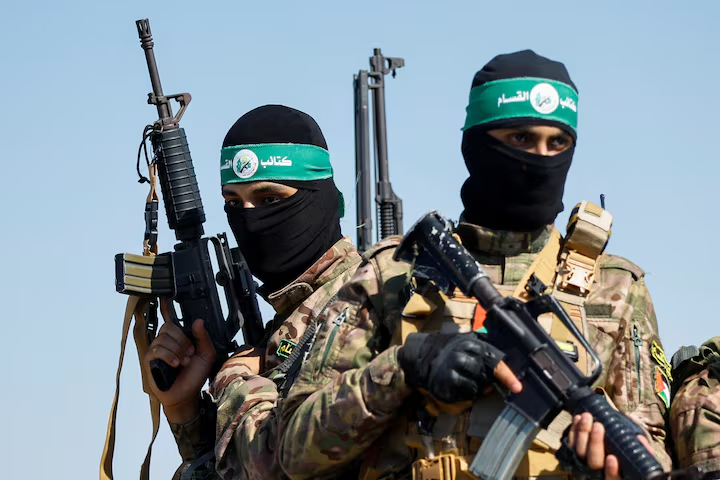The United States vowed to take “all necessary actions” to defend American forces after a drone attack killed three U.S. troops in Jordan, while Qatar said it hoped U.S. retaliation would not damage regional security or undercut progress toward a new Gaza hostage-release deal.
Sunday’s attack by Iran-backed militants was the first deadly strike against U.S. troops since the Israel-Hamas war erupted in October and marks a major escalation in tensions that have engulfed the Middle East.
White House National Security spokesman John Kirby said on Monday the United States did not want a wider war with Iran or in the region, “but we got to do what we have to do.”
Iran has denied any role. Biden has previously ordered retaliatory attacks on Iran-backed groups but has so far stopped short of hitting Iran directly.
“Have no doubt – we will hold all those responsible to account at a time and in a manner of our choosing,” Biden said on Sunday, while Austin said at the Pentagon on Monday:
“The president and I will not tolerate attacks on U.S. forces and we will take all necessary actions to defend the U.S. and our troops.”
In Gaza, Israel launched an assault on the Hamas-ruled enclave’s biggest city. Residents of Gaza City said air strikes killed and wounded many people, while tanks shelled eastern areas and naval vessels fired at western beachfront areas.
Israel said late last year it had largely completed operations in northern Gaza and has recently aimed the brunt of its might at southern Gaza. The renewed push in Gaza City, where residents reported fierce gun battles near the main Al-Shifa Hospital, suggested that the war was not going to plan.
Biden’s administration is under pressure to respond to the drone attack firmly without triggering a wider war. It has also been trying to facilitate the release by Hamas, which rules Gaza, of more than 100 hostages seized by the militants in their deadly Oct. 7 rampage into southern Israel.
Qatari Prime Minister Sheikh Mohammed bin Abdulrahman bin Jassim al Thani told a Washington think tank he hoped U.S. retaliation would not undercut progress toward a new hostage release deal in talks last weekend.
He said potential U.S. retaliation “will definitely have an impact on regional security and we hope things get contained.”
CIA Director William Burns met Sheikh Mohammed, as well as the head of Israel’s Mossad intelligence service and the head of Egyptian intelligence, on Sunday in Paris for talks described as constructive by Israel, Qatar and the U.S., albeit with significant gaps remaining.
U.S. Secretary of State Antony Blinken said the Paris talks raised hope that a Qatar-mediated negotiating process could resume. Before collapsing, the mechanism led to a week-long ceasefire agreement in November when Hamas freed around 100 hostages.
A framework for a possible second deal developed in Paris “is a strong one and a compelling one that … offers hope that we can get back into this process,” he said at a news conference with NATO Secretary General Jens Stoltenberg.
“Hamas will have to make its own decisions,” said Blinken, who declined to reveal details of the proposal.
HAMASS SAYS ISRAEL MUST WITHDRAW
Hamas reiterated on Monday that Israel must halt its Gaza offensive and withdraw from the Gaza Strip before more hostages are freed. Israel says it will fight until Hamas is eradicated.
According to Israel, some 1,200 people were killed and 253 abducted in the Oct. 7 attack, which sparked its war to eliminate Hamas. Israel has since unleashed a military campaign on Gaza that has flattened most of the Palestinian enclave and killed 26,637 people, according to Gaza health officials.
Tensions have surged around the Middle East, with Yemen’s Iran-backed Houthi forces striking U.S. and other targets in the Red Sea in attacks that have disrupted global shipping.
On Monday, Hamas fired its first volley of rockets for weeks into Israeli cities, proving it still had the capability to launch them after nearly four months of war.
Gazans say the violence has made a mockery of a World Court ruling last week calling on Israel to do more to help civilians.
Israel ordered new evacuations of the most populated areas of Gaza City, but people said communications blackouts meant many would miss the alerts. Israel says Hamas is responsible for the deaths of civilians because its fighters operate among them, which the fighters deny.
People in the north have been grinding animal feed to make flour after flour, rice and sugar ran out, part of an aid crisis now potentially exacerbated by a withdrawal of support for the United Nations’ aid agency for Palestinian refugees, UNRWA.
The United States and several other countries have suspended aid to the agency since Friday after Israel said some 190 UNRWA employees, including teachers, have doubled as Hamas or Islamic Jihad militants. Israel said some took part in the Oct. 7 Hamas attacks on Israel, which killed about 1,200 people.
U.N. Secretary-General Antonio Guterres met the head of U.N. internal investigations to ensure an inquiry into the allegations “will be done swiftly and as efficiently as possible,” a U.N. spokesperson said.
UNRWA, which says more than 150 of its staff have been killed since October and a million Palestinians are sheltering in its buildings, said it would have to end operations within a month if funding was not restored.
It said it had promptly fired staff after being alerted to Israel’s allegations









